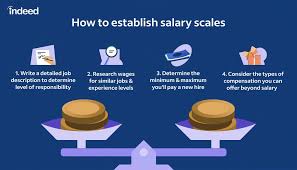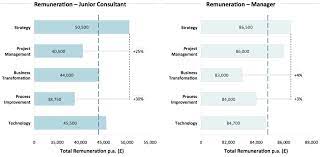Salaries: Understanding the Value of Compensation
In today’s world, salaries play a crucial role in our lives. They not only provide us with financial stability but also reflect the value of our skills and contributions in the workplace. Understanding salaries and their significance is essential for both employees and employers alike.
For employees, salaries are more than just numbers on a payslip. They represent the recognition of their hard work, expertise, and experience. A fair and competitive salary can boost morale, motivation, and job satisfaction. It can also serve as a measure of personal growth and professional development.
When considering salaries, it’s important to take into account various factors such as industry standards, job responsibilities, qualifications, experience level, and location. These variables influence the overall compensation package offered to an employee. Additionally, companies may consider other benefits such as healthcare coverage, retirement plans, bonuses, or flexible working arrangements when determining an employee’s total compensation.
While money is undoubtedly a significant factor when it comes to salaries, it is not the sole indicator of job satisfaction or success. Other elements like work-life balance, career progression opportunities, company culture, and job security also contribute to overall job satisfaction.
On the employer’s side, offering competitive salaries is crucial for attracting top talent in today’s competitive job market. Companies that provide fair compensation packages are more likely to attract skilled professionals who can drive innovation and contribute to business growth. Moreover, offering competitive salaries helps retain valuable employees by demonstrating that their efforts are valued and rewarded appropriately.
Employers should conduct regular salary benchmarking exercises to ensure that their compensation packages remain competitive within their industry. This involves comparing salary ranges for similar roles in other companies to ensure that employees are being fairly compensated based on market standards.
Transparent communication about salary structures is also vital for fostering trust between employers and employees. Open discussions about pay scales help create an environment where employees feel comfortable discussing their remuneration openly while ensuring fairness across the organization.
It is worth noting that salaries can vary considerably across different industries and regions. Factors such as supply and demand for specific skills, cost of living, economic conditions, and company size can influence salary ranges. Therefore, it’s essential to research and understand industry standards to set realistic salary expectations.
In conclusion, salaries are a vital aspect of our professional lives. They reflect the value we bring to our roles and impact our overall job satisfaction. For employers, offering competitive salaries is crucial for attracting and retaining top talent. For employees, fair compensation is not only a means of financial stability but also a recognition of their skills and contributions. By understanding the value of salaries and ensuring fairness in compensation packages, both employers and employees can thrive in today’s dynamic work environment.
9 Advantages of Salaries: Financial Security, Job Stability, and More
- Salaries provide financial security and stability.
- Salaried employees typically have more job security than those who are self-employed or on contract.
- Salaries can be a motivating factor for employees to work hard and achieve their goals.
- Regular salaries offer the opportunity to plan finances in advance, as you know what your income is likely to be each month or year.
- Salaried employees often receive additional benefits such as health insurance, retirement contributions, paid holidays and sick days which add value to their overall package of remuneration.
- Employees with salaries may be entitled to overtime pay if they work extra hours beyond their standard working day or week which can increase their earnings significantly over time..
- Companies may offer bonuses or other incentives linked directly to performance which can add further financial rewards for salaried staff members who exceed expectations in the workplace..
- Salary increases based on length of service or other criteria are commonplace in many organisations, providing an additional reward for loyalty and commitment over a period of time..
- Salary payments are usually made on a regular basis so that employees always know when they will receive their money, enabling them to better manage their finances accordingly
Challenges of Salaries in the UK: Financial Hardship, Inflation Gap, Motivation Issues, and Lack of Transparency
- Low salaries can cause financial hardship, leading to stress and anxiety.
- Salaries may not keep up with inflation, meaning that the cost of living is increasing faster than wages.
- Low salaries can lead to a lack of motivation in the workplace due to employees feeling undervalued and unappreciated.
- Salaries are often not transparent, leaving employees feeling uncertain about their worth and unable to negotiate for better pay or benefits.
Salaries provide financial security and stability.
Salaries: Providing Financial Security and Stability
In a world where financial stability is crucial, salaries play a vital role in providing individuals with the much-needed sense of security. Whether you’re just starting your career or have been working for years, a steady income allows you to meet your financial obligations and plan for the future.
One of the primary benefits of salaries is that they provide a reliable source of income. Knowing that you will receive a fixed amount at regular intervals allows you to budget and manage your finances effectively. This stability empowers individuals to cover their day-to-day expenses, pay bills, and meet their financial responsibilities without constant worry or uncertainty.
Moreover, salaries offer financial security by providing a safety net during unexpected circumstances. Life can be unpredictable, and having a consistent income can help navigate through challenging times such as medical emergencies, unforeseen expenses, or job loss. With savings built from regular paychecks, individuals can create an emergency fund to handle unforeseen situations more effectively.
Additionally, salaries enable individuals to plan for their future and work towards long-term financial goals. Whether it’s saving for retirement, purchasing a home, starting a family, or investing in education or personal growth opportunities, having a stable income provides the foundation for achieving these milestones. It allows individuals to create structured financial plans and make informed decisions about their future.
Financial stability also extends beyond individual well-being; it positively impacts families and communities as well. With dependable incomes, individuals can support their loved ones financially and contribute to the overall economic growth of their community. Stable salaries enable families to provide for their children’s education, healthcare needs, and overall quality of life.
Furthermore, salaries contribute to overall peace of mind by reducing stress related to financial matters. When individuals have confidence in their ability to meet their financial obligations consistently, they can focus on other aspects of life such as personal growth, pursuing hobbies and interests or maintaining good mental health.
It is important for both employers and employees to recognize the significance of salaries in providing financial security and stability. Employers should strive to offer fair and competitive compensation packages that align with industry standards. Regular salary reviews and adjustments based on performance, experience, and market conditions can further enhance financial security for employees.
In conclusion, salaries play a crucial role in providing individuals with the financial security and stability they need to lead fulfilling lives. A steady income allows individuals to meet their day-to-day expenses, plan for the future, handle unexpected circumstances, support their families, and contribute to their communities. By valuing fair compensation and recognizing the importance of financial stability, both employers and employees can create an environment that promotes overall well-being and success.
Salaried employees typically have more job security than those who are self-employed or on contract.
The Benefit of Job Security: Salaried Employees
In today’s ever-changing job market, job security is a highly valued aspect for any employee. Salaried employees often enjoy a greater sense of stability compared to their self-employed or contract counterparts. This advantage is one of the many reasons why salaried positions continue to be sought after.
Job security provides individuals with a peace of mind, allowing them to focus on their professional growth and personal lives without constant worry about their next paycheck or uncertain future. Salaried employees typically have the assurance of a steady income stream, which enables them to plan for the long term, make financial commitments, and achieve their goals with greater confidence.
Unlike self-employed individuals or those on contract, salaried employees often benefit from employment contracts that outline the terms and conditions of their employment. These contracts typically include provisions related to notice periods, severance pay, and protection against unfair dismissal. Such legal safeguards contribute to the overall sense of security that comes with being a salaried employee.
Additionally, salaried employees are more likely to have access to employee benefits such as healthcare coverage, retirement plans, paid time off, and other perks offered by their employers. These benefits not only enhance the overall compensation package but also provide additional layers of security and support for employees in times of need.
Job security also extends beyond financial stability. Salaried employees often have opportunities for career growth within their organizations. They can pursue promotions or take on new responsibilities without the fear of losing their livelihoods. This sense of stability encourages professional development and fosters loyalty among employees who feel valued and supported in their career progression.
Moreover, salaried positions often come with a greater sense of belonging within an organization. Employees become part of a team or department where they can build relationships with colleagues and develop a deeper understanding of company culture. This sense of belonging contributes to job satisfaction and further reinforces job security as employees are more likely to have a support system in place during challenging times.
While job security is a significant advantage of salaried employment, it is important to note that no job is entirely immune to economic fluctuations or organizational changes. However, salaried employees generally have a higher level of protection and stability compared to those who are self-employed or on contract.
In conclusion, the job security that comes with being a salaried employee offers numerous benefits. It provides individuals with financial stability, peace of mind, and the ability to plan for the future. Salaried positions often come with legal protections and access to employee benefits that further enhance this sense of security. Additionally, opportunities for career growth and a sense of belonging within an organization contribute to overall job satisfaction. While no job is entirely risk-free, being a salaried employee typically offers greater stability compared to other employment arrangements.
Salaries can be a motivating factor for employees to work hard and achieve their goals.
Salaries: A Motivating Force for Employee Success
In the realm of work, salaries serve as more than just a means to an end. They possess the remarkable power to motivate employees, inspiring them to work diligently and strive for their goals. Understanding the motivational aspect of salaries is key to fostering a productive and driven workforce.
One of the primary ways in which salaries motivate employees is by providing a tangible reward for their efforts. When individuals see their hard work reflected in their pay, it reinforces the notion that their contributions are valued and recognised. This recognition acts as a powerful incentive, encouraging employees to continue performing at their best and surpassing expectations.
Moreover, salaries serve as a form of extrinsic motivation – an external factor that influences behaviour. By offering competitive wages, employers create an environment where employees are motivated to excel in their roles. The prospect of earning a higher salary or receiving performance-based bonuses encourages individuals to go above and beyond, pushing themselves towards greater achievements.
Salaries also play a crucial role in goal-setting and career progression. Employees often set personal targets, both short-term and long-term, which they aim to accomplish within specific timeframes. The prospect of financial growth through salary increases or promotions fuels their determination to meet these objectives. By linking performance with monetary rewards, employers can effectively align individual goals with organisational objectives.
Furthermore, salaries can impact employee morale and job satisfaction. When employees feel that they are being fairly compensated for their efforts, it creates a sense of fulfillment and contentment in their work. This positive sentiment translates into increased job satisfaction and overall happiness within the workplace. Motivated employees who feel valued are more likely to remain loyal to their employers, reducing turnover rates and fostering a stable workforce.
It’s important for employers to recognise that while salaries are undoubtedly influential motivators, they are not the sole driving force behind employee performance. Factors such as recognition, opportunities for growth, meaningful work, supportive environments, and work-life balance also contribute to overall motivation and job satisfaction.
In conclusion, salaries possess the ability to serve as a powerful motivator for employees. By offering competitive compensation packages, employers can inspire individuals to work hard, exceed expectations, and achieve their goals. Salaries not only provide tangible rewards for employees’ efforts but also contribute to their morale and job satisfaction. By understanding the motivational impact of salaries and combining them with other factors that drive employee engagement, employers can create an environment that fosters success and productivity.
Regular salaries offer the opportunity to plan finances in advance, as you know what your income is likely to be each month or year.
The Benefits of Regular Salaries: Financial Planning Made Easy
One of the significant advantages of receiving a regular salary is the ability to plan your finances in advance. Knowing what your income is likely to be each month or year provides a sense of stability and allows for effective financial management.
With a regular salary, you can create a budget and allocate funds for various expenses such as bills, rent or mortgage payments, groceries, transportation, and savings. This predictability enables you to plan ahead and make informed decisions about your financial goals.
Financial planning becomes more manageable when you have a consistent income stream. You can set realistic targets for saving, investing, or paying off debts. By having a clear understanding of your monthly or annual earnings, you can establish achievable milestones and work towards long-term financial security.
Regular salaries also provide peace of mind during uncertain times. Knowing that you have a steady income allows you to build an emergency fund that can support you during unexpected situations such as medical emergencies or job loss. This cushion acts as a safety net and provides financial stability during challenging periods.
Furthermore, the predictability of regular salaries simplifies the process of managing day-to-day expenses. It eliminates the need to constantly worry about whether there will be enough money to cover essential costs. This stability enables individuals and families to focus on other aspects of their lives without being burdened by financial stress.
In addition to personal benefits, regular salaries contribute positively to the overall economy. When individuals have stable incomes, they are more likely to engage in consumer spending. This increased spending stimulates economic growth by supporting businesses and creating job opportunities.
Overall, the ability to plan finances in advance is an invaluable pro of receiving regular salaries. It offers individuals a sense of security and control over their financial well-being. By allowing for effective budgeting and providing stability during uncertain times, regular salaries empower individuals to work towards their financial goals while contributing positively to the economy at large.
Salaried employees often receive additional benefits such as health insurance, retirement contributions, paid holidays and sick days which add value to their overall package of remuneration.
Salaried Employees: Unlocking Additional Benefits for a Well-Rounded Compensation Package
When it comes to salaries, one significant advantage for salaried employees is the additional benefits that often come bundled with their compensation. These extra perks go beyond the basic pay and add considerable value to their overall package of remuneration.
One of the most valuable benefits salaried employees receive is health insurance coverage. In many cases, employers contribute a portion or even the entire premium cost, providing employees with access to comprehensive medical, dental, and vision care. This not only promotes physical well-being but also provides peace of mind, knowing that healthcare expenses are partially or fully covered.
Retirement contributions are another valuable benefit frequently offered to salaried employees. Employers may contribute to retirement savings plans such as 401(k) or pension schemes, helping employees build a financial safety net for their future. These contributions can significantly enhance long-term financial security and provide a sense of stability during retirement years.
Paid holidays and sick days are additional perks that bring immense value to salaried employees. Paid holidays allow individuals to take time off work without worrying about lost wages. It enables them to spend quality time with family and friends during festive seasons or pursue personal interests and hobbies. Similarly, paid sick days ensure that employees can take time off when they are unwell without experiencing financial strain.
Furthermore, some companies offer flexible working arrangements as part of their benefits package for salaried employees. This may include options like remote work, flexible hours, or compressed workweeks. Such arrangements promote work-life balance by allowing individuals to manage personal responsibilities alongside professional commitments effectively.
The inclusion of these additional benefits in a salary package demonstrates an employer’s commitment towards employee well-being and job satisfaction. It not only attracts top talent but also helps retain valuable employees in the long run.
For salaried employees, these benefits go beyond just monetary value; they provide a sense of security, stability, and overall job satisfaction. They contribute to a positive work environment and foster a sense of loyalty and dedication towards the company.
It is important for both employers and employees to recognize the significance of these additional benefits and understand their impact on overall compensation. Open communication between employers and employees about these perks can help create a transparent work culture where expectations are clear, leading to increased job satisfaction for all parties involved.
In conclusion, the additional benefits that salaried employees often receive are a valuable aspect of their compensation package. From health insurance coverage to retirement contributions, paid holidays, sick days, and flexible working arrangements, these perks enhance the overall value of their remuneration. Employers who provide these benefits demonstrate their commitment towards employee well-being, attracting and retaining top talent while fostering a positive work environment. For salaried employees, these benefits contribute to financial security, work-life balance, and overall job satisfaction.
Employees with salaries may be entitled to overtime pay if they work extra hours beyond their standard working day or week which can increase their earnings significantly over time..
The Benefits of Salaries: Unlocking Overtime Pay
One of the advantages of being an employee with a salary is the potential to earn overtime pay. Overtime pay refers to the additional compensation received for working extra hours beyond the standard working day or week. This provision can significantly increase an employee’s earnings over time, providing both financial rewards and recognition for their dedication and hard work.
Overtime pay is typically regulated by employment laws and varies from country to country. In many jurisdictions, employees who work more than a certain number of hours per day or week are entitled to receive additional compensation for their extra efforts. This additional pay rate is often higher than the regular hourly wage, incentivizing employees to take on additional work when required.
For employees, overtime pay offers a valuable opportunity to boost their income. By dedicating extra hours towards their job responsibilities, they can earn more money while demonstrating their commitment and willingness to go above and beyond. This can be especially beneficial for individuals who are looking to save, invest, or achieve specific financial goals.
Over time, the accumulation of overtime pay can have a significant impact on an employee’s overall earnings. It provides an avenue for them to increase their income steadily without necessarily seeking a promotion or switching jobs. This aspect of salaries allows individuals to have greater control over their financial growth and stability.
Furthermore, overtime pay serves as a form of recognition for an employee’s hard work and dedication. It acknowledges the extra effort put in by individuals who are willing to go that extra mile when required by their employers. This recognition not only boosts morale but also fosters a sense of satisfaction and loyalty towards the organization.
However, it’s important for employers and employees alike to maintain a healthy balance when it comes to overtime work. While overtime pay can be financially rewarding, excessive workload can lead to burnout and negatively impact overall well-being. It is essential for employers to promote work-life balance while ensuring that overtime work is compensated fairly.
In conclusion, the provision of overtime pay for employees with salaries is a valuable benefit that can significantly increase their earnings over time. It serves as an incentive for individuals to invest their extra time and effort into their work, while also recognizing their dedication and commitment. By striking a balance between additional compensation and maintaining a healthy work-life balance, both employers and employees can benefit from this aspect of salary packages.
Boosting Performance and Rewards: The Power of Performance-Linked Incentives
In the realm of salaries, there is a pro that goes beyond the regular paycheck. Companies often provide additional incentives, such as bonuses or rewards, directly linked to an employee’s performance. These performance-linked incentives serve as powerful motivators and can significantly enhance the financial rewards for salaried staff members who exceed expectations in the workplace.
Performance-linked incentives offer a win-win situation for both employees and employers. For employees, these incentives provide an opportunity to earn additional income based on their exceptional performance. This not only recognises their hard work but also serves as a tangible reward for going above and beyond in their roles.
These incentives can take various forms, such as performance-based bonuses, profit-sharing schemes, commission structures, or stock options. By aligning financial rewards with individual or team achievements, companies create a strong incentive for employees to strive for excellence and contribute to the overall success of the organization.
From an employer’s perspective, performance-linked incentives act as powerful tools to drive productivity and engagement within the workforce. By offering financial rewards tied directly to performance outcomes, companies create a culture of meritocracy where exceptional efforts are acknowledged and rewarded accordingly.
This approach cultivates a sense of healthy competition among employees and encourages them to set ambitious goals while continuously improving their skills and performance. It also fosters a results-oriented mindset that benefits both individual employees and the company as a whole.
Performance-linked incentives also contribute to employee retention by creating an environment where high performers feel valued and motivated to stay with the company. Knowing that their efforts will be recognized financially provides an added sense of job security and satisfaction.
Moreover, these incentives promote transparency and fairness within organizations. Clear criteria are established for earning these rewards, ensuring that they are awarded based on objective measures rather than subjective judgments. This transparency helps build trust between employers and employees by demonstrating that outstanding contributions are duly acknowledged.
However, it is important to note that performance-linked incentives should be implemented thoughtfully and with careful consideration. The criteria for earning these rewards should be well-defined, communicated clearly, and consistently applied across the organization. This ensures that employees understand what is expected of them and can actively work towards meeting or exceeding those expectations.
In conclusion, performance-linked incentives are a valuable pro of salaries that can greatly enhance the financial rewards for salaried staff members who excel in their roles. By directly linking financial incentives to individual or team achievements, companies create a culture of excellence and motivation. These incentives not only drive performance and productivity but also contribute to employee satisfaction and retention. When implemented effectively, performance-linked incentives serve as powerful tools for both employees and employers, fostering growth and success within the workplace.
Salary increases based on length of service or other criteria are commonplace in many organisations, providing an additional reward for loyalty and commitment over a period of time..
Rewarding Loyalty and Commitment: The Benefits of Salary Increases Based on Length of Service
In many organisations, salary increases based on length of service or other criteria have become a common practice. This approach offers an additional reward for employees who demonstrate loyalty and commitment over a period of time. Such salary increases not only benefit individual employees but also contribute to the overall success of the organisation.
Recognising and rewarding long-term dedication is essential for fostering a sense of loyalty among employees. When employees see that their commitment to the company is acknowledged and appreciated, they are more likely to feel motivated and engaged in their work. Salary increases based on length of service serve as a tangible way to demonstrate this appreciation, encouraging employees to stay with the organisation for the long haul.
These salary increases also provide financial stability and security for employees as they progress in their careers. As individuals gain experience and develop expertise within their roles, their contributions become increasingly valuable to the organisation. Rewarding this growth with incremental salary increases ensures that employees feel valued and fairly compensated for their continuous development.
Moreover, salary increases based on length of service can help reduce turnover rates within an organisation. When employees see that there are opportunities for advancement and increased compensation by staying with the company, they are more likely to remain loyal. This leads to higher retention rates, which can save organisations both time and resources associated with recruiting and training new staff members.
Additionally, these types of salary increases can foster a positive work culture by promoting stability and continuity within teams. Employees who have been with the organisation for an extended period often possess valuable institutional knowledge and understand the company’s values, processes, and goals more deeply. Their experience can be leveraged to mentor newer team members, resulting in improved collaboration and knowledge sharing across the organisation.
It is important to note that while length-of-service-based salary increases have numerous benefits, they should be implemented alongside other performance-based rewards systems. Recognising exceptional performance and achievements should still be a priority in order to maintain a fair and motivating work environment. A combination of both loyalty-based and performance-based rewards can strike a balance that encourages long-term commitment while also incentivising continuous growth and improvement.
In conclusion, salary increases based on length of service or other criteria provide an additional reward for loyalty and commitment within organisations. They not only acknowledge employees’ long-term dedication but also contribute to their financial stability and job satisfaction. By implementing these salary increases, organisations can foster loyalty, reduce turnover rates, promote knowledge sharing, and create a positive work culture. Balancing these rewards with performance-based incentives ensures that employees feel valued for both their tenure and their individual contributions.
Salary payments are usually made on a regular basis so that employees always know when they will receive their money, enabling them to better manage their finances accordingly
The Consistency and Financial Stability of Regular Salary Payments
One significant advantage of salaries is the consistency and predictability they offer in terms of payment. In most employment scenarios, salaries are paid on a regular basis, whether it be monthly, bi-weekly, or weekly. This regularity provides employees with a sense of financial stability and allows them to plan and manage their finances effectively.
Knowing when they will receive their salary enables employees to budget their expenses, pay bills on time, and plan for future financial goals. It eliminates the uncertainty that can arise from irregular income streams or freelance work. With a steady paycheck, individuals can confidently make financial commitments such as rent or mortgage payments, utility bills, and other essential expenses.
Regular salary payments also foster a sense of security among employees. They can rely on this consistent income to cover their basic needs and fulfill their financial obligations. This stability is particularly important during times of economic uncertainty or unexpected events. It provides a safety net that allows individuals to navigate through challenging periods without undue stress.
Moreover, the predictability of salary payments allows employees to plan for the future. They can set aside savings for emergencies or invest in long-term goals such as retirement planning or education funds for themselves or their families. The knowledge that they will receive a fixed amount at regular intervals empowers individuals to make informed financial decisions and work towards achieving their aspirations.
From an employer’s perspective, providing regular salary payments demonstrates reliability and commitment to their workforce. It enhances trust and fosters positive employee relations by ensuring that staff members are compensated promptly for their hard work.
In conclusion, the consistency and financial stability offered by regular salary payments are invaluable benefits for both employees and employers alike. Employees can better manage their finances with confidence, plan for the future, and feel secure in their employment. Employers can cultivate trust among their workforce by demonstrating reliability in compensating employees fairly and on time. Ultimately, this pro of salaries contributes to a healthier and more productive work environment.
Low salaries can cause financial hardship, leading to stress and anxiety.
The Con of Low Salaries: Financial Hardship and its Emotional Toll
Low salaries can have a significant impact on individuals, causing financial hardship that often leads to stress and anxiety. When earnings are insufficient to meet basic needs and cover expenses, it creates a ripple effect that affects various aspects of one’s life.
Financial hardship resulting from low salaries can lead to a constant state of worry and anxiety. The inability to make ends meet or save for the future can cause immense stress, as individuals struggle to manage their day-to-day expenses. This stress can permeate all areas of life, affecting relationships, mental well-being, and overall quality of life.
The pressure to make ends meet with limited resources can lead to difficult choices and sacrifices. Individuals may find themselves cutting back on essential expenses such as healthcare, education, or even nutritious food. This compromises their physical and mental well-being in the long run.
Moreover, financial strain can hinder personal growth and development. Limited funds make it challenging to invest in education or acquire new skills that could enhance career prospects. This lack of upward mobility can further contribute to feelings of frustration and dissatisfaction.
Low salaries also impact individuals’ ability to build a secure future. Insufficient income makes it difficult to save for emergencies or retirement, leaving individuals vulnerable in times of unexpected financial setbacks. The absence of a safety net intensifies anxiety about the future and perpetuates a cycle of financial instability.
Furthermore, the emotional toll caused by low salaries extends beyond an individual’s personal life. It can affect job performance and motivation levels. When employees are preoccupied with financial worries, their focus at work may suffer, leading to decreased productivity and engagement.
Addressing the issue of low salaries requires collective efforts from both employers and policymakers. Employers should strive towards fair compensation practices that align with industry standards while considering the cost of living in specific regions. Regular salary reviews based on performance evaluations can help ensure that employees are rewarded appropriately for their contributions.
Policymakers can play a role in advocating for fair wages and implementing policies that protect workers’ rights. This includes setting minimum wage standards that reflect the cost of living, promoting income equality, and providing support systems for those facing financial hardship.
In conclusion, low salaries can have a detrimental impact on individuals, causing financial hardship that leads to stress and anxiety. The emotional toll of struggling to make ends meet affects overall well-being, relationships, and job performance. Addressing this con requires a collective effort to ensure fair compensation practices and implement policies that protect workers’ rights. By valuing employees’ contributions and providing adequate compensation, we can alleviate financial strain and promote a healthier work-life balance.
Salaries may not keep up with inflation, meaning that the cost of living is increasing faster than wages.
The Challenge of Inflation: When Salaries Fail to Keep Pace
One of the significant concerns regarding salaries is their ability to keep up with inflation. In an ideal world, wages would rise in parallel with the increasing cost of living. However, in reality, this is not always the case, leading to a situation where the cost of living outpaces salary growth.
Inflation refers to the general increase in prices over time. When salaries fail to keep pace with inflation, individuals find it increasingly difficult to maintain their standard of living. As prices for essential goods and services rise, such as housing, food, healthcare, and transportation, people’s purchasing power diminishes.
This conundrum creates financial strain for individuals and families. They may find themselves struggling to cover their basic needs and facing challenges in meeting other financial obligations such as debt repayments or saving for the future. The gap between income and expenses widens as inflation erodes the value of wages.
This issue becomes particularly pronounced when wage growth stagnates or lags behind rising costs. If salaries remain stagnant while prices continue to climb, individuals may be forced to make difficult choices regarding their spending habits or seek additional sources of income.
Moreover, when salaries fail to keep up with inflation, it can lead to growing income inequality within society. Those who are already financially disadvantaged are disproportionately affected by rising costs. The gap between the rich and poor widens as those with higher incomes have more flexibility in coping with increased expenses.
For employers, failing to address this issue can result in employee dissatisfaction and reduced productivity. When employees struggle financially due to stagnant wages amidst rising costs, their morale may decline and motivation wanes. This can negatively impact overall job satisfaction and employee retention rates.
To mitigate this challenge, it is crucial for employers and policymakers alike to consider strategies that ensure fair compensation in line with inflation rates. Regular salary reviews should be conducted based on economic indicators and market trends. Employers should also consider offering additional benefits such as cost-of-living adjustments, performance-based bonuses, or flexible working arrangements to help employees cope with rising expenses.
Furthermore, individuals must be proactive in managing their finances. This includes budgeting effectively, seeking opportunities for career advancement or additional income streams, and staying informed about economic trends that may impact their financial well-being.
In conclusion, the failure of salaries to keep up with inflation presents a significant challenge for individuals and families. It can lead to financial strain, growing income inequality, and reduced job satisfaction. Employers and policymakers should address this issue by implementing fair compensation practices that consider inflation rates. Likewise, individuals must take proactive steps to manage their finances effectively in the face of rising costs. By addressing this con of salaries, we can work towards a more equitable and sustainable economy.
Low salaries can lead to a lack of motivation in the workplace due to employees feeling undervalued and unappreciated.
The Conundrum of Low Salaries: The Impact on Workplace Motivation
In the realm of salaries, one significant con that cannot be overlooked is the adverse effect that low compensation can have on employee motivation. When employees feel undervalued and unappreciated due to inadequate salaries, it can lead to a lack of drive and enthusiasm in the workplace.
Money, although not the sole motivator, plays a crucial role in shaping an individual’s perception of their worth within an organization. When employees receive low salaries that do not align with their skills, qualifications, or industry standards, it can create a sense of dissonance and dissatisfaction. They may question their value and contributions to the company.
A lack of motivation stemming from low salaries can manifest in various ways. Employees may become disengaged from their work, resulting in decreased productivity and efficiency. The quality of work may suffer as individuals lose the incentive to go above and beyond. This lack of motivation can also lead to higher rates of absenteeism and turnover as employees seek better opportunities elsewhere.
Moreover, when employees feel undervalued due to low salaries, it can negatively impact their morale and overall job satisfaction. They might perceive a lack of recognition for their efforts and talents, which can erode loyalty towards the organization. This could result in decreased commitment and loyalty towards the company’s goals.
To mitigate this conundrum, employers should consider fair compensation practices that align with industry standards and recognize employee contributions appropriately. Regular salary reviews based on performance evaluations or market research can help ensure that employees are compensated fairly for their skills and efforts.
Additionally, non-monetary incentives such as career development opportunities, recognition programs, flexible working arrangements, or a positive work environment can help offset some of the demotivating effects caused by lower salaries. Providing opportunities for growth and advancement demonstrates that employees are valued beyond just their monetary worth.
Transparent communication about salary structures is vital in fostering trust and understanding between employers and employees. When employees have a clear understanding of how their salaries are determined and the potential for growth, it can help alleviate feelings of being undervalued.
Ultimately, it is crucial for organizations to recognize that low salaries can have a significant impact on employee motivation. By addressing this issue through fair compensation practices, providing non-monetary incentives, and fostering open communication, employers can create an environment where employees feel valued and motivated to perform their best. Investing in employee satisfaction and well-being ultimately benefits both individuals and the organization as a whole.
Salaries are often not transparent, leaving employees feeling uncertain about their worth and unable to negotiate for better pay or benefits.
The Lack of Salary Transparency: Empowering Employees for Fair Compensation
One significant con of salaries in many workplaces is the lack of transparency. When it comes to compensation, many companies tend to keep salary information confidential, leaving employees in the dark about their worth and making it difficult for them to negotiate for better pay or benefits.
The absence of salary transparency can lead to feelings of uncertainty and frustration among employees. Without clear knowledge of what their colleagues or counterparts are earning, individuals may question whether they are being fairly compensated for their skills, experience, and contributions. This lack of transparency can create a sense of inequality and erode trust within the organization.
Moreover, without access to salary information, employees may find it challenging to negotiate for better pay or benefits during performance reviews or when considering job offers. Negotiating becomes a guessing game, as individuals have limited knowledge about what others in similar positions are earning. This puts employees at a disadvantage when it comes to advocating for fair compensation and can perpetuate existing pay gaps within the workforce.
Salary transparency is not only beneficial for individual employees but also promotes a more equitable work environment overall. When salaries are openly discussed and communicated across the organization, it helps ensure that everyone is being paid fairly based on their qualifications and contributions. Transparent salary structures also help address any potential biases in compensation decisions.
Companies that embrace salary transparency often see positive outcomes. It fosters a culture of trust, openness, and fairness among employees. It also enables individuals to have informed conversations about their compensation with management, leading to more constructive discussions around career development and progression.
To address this con effectively, organizations should consider implementing transparent salary policies. This includes providing clear guidelines on how salaries are determined and openly discussing pay scales with employees. By doing so, companies empower their workforce with the knowledge they need to understand their own worth and negotiate fair compensation packages.
Furthermore, employers should regularly review their compensation practices to ensure they align with industry standards and promote pay equity. Conducting salary audits and addressing any discrepancies can help rectify any existing disparities and foster a more inclusive work environment.
In conclusion, the lack of salary transparency can leave employees feeling uncertain about their worth and hinder their ability to negotiate for better pay or benefits. However, organizations that prioritize transparency in compensation can empower their employees, foster trust, and create a fairer work environment for all. By openly discussing salaries and implementing fair compensation practices, companies can ensure that employees are valued appropriately for their skills and contributions.









